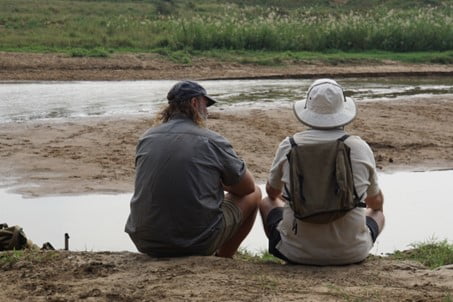Every day we experience situations that we learn from. New connections are then created in our brain. But do they linger? And does this change something permanently in our attitude and behavior?
Comfort zone
Sometimes, scientists say. But these must be experiences that really touch us. A study by Charles Jennings (2015) shows that we learn the most (70%) from personal experiences that feel uncomfortable. For about 20% we learn from coaching and getting feedback, and the remaining 10% comes from the conventional forms of learning (books, lectures, etc).
At a Wilderness Trail, participants experience intensely what it is like to get out of their comfort zone. That makes a deep impression, such that they experience the trail as a ‘life-changing experience’. In retrospect, they report that it has brought about a lasting change in their view of themselves, of others, and of the world. Their attitude and behavior is then transformed.
Experiential learning
The power of the transformation process during the trail lies in four forms of’ experiential learning', which partly merge and reinforce each other.
First, there is experience it yourself, such as from the deep connectedness with nature, the realization that we ourselves are part of nature rather than above nature. For example, the ‘night-watch’ is an exciting experience to be alone at night under a beautiful starry sky in the wilderness with all kinds of strange noises. A unique lesson that undeniably increases self-confidence and self-reliance.
Emotional learning
The second learning process is ‘emotional learning’. Participants experience a deeply moving sense of the meaning of carefully observing and deeply listening to nature and to the other. Emotionally sharing personal life stories and daring to show vulnerability deepens self-awareness, and leads to more open interconnectedness.
Peer learning
Peer learning is the third learning process. ’ Talking-stick ' sessions in the group or one-on-one conversations take place in an open atmosphere of trust and safety. The mirroring of Life Stories allows participants to reflect on their values and emotions, and to define their own anchor points.
Social learning
Finally, there is’social learning'. The guides play an important role in this. With their knowledge of nature, their professionalism, experience and wisdom, they act as role models of natural leadership through their unity with nature and the way they treat nature with respect.
Peak experience
The culmination of these learning processes ensures that somewhere along the trail each participant experiences that special 'peak experience‘, the’ defining moment' that remains anchored in the episodic memory for life.
“There is always a crack, that’s how the light gets in.”
Boy Van Droffelaar, PhD



